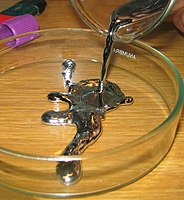
Photo from wikipedia
Abstract This work demonstrates the viability of MEAs based on Nafion membranes for being used in reversible electrochemical cells for the chloralkali process. It also shows the effect of the… Click to show full abstract
Abstract This work demonstrates the viability of MEAs based on Nafion membranes for being used in reversible electrochemical cells for the chloralkali process. It also shows the effect of the operation temperature, from room temperature up to 80 °C, and humidification of the chlorine stream on the performance of these cells as fuel cell. Results demonstrate that these cells can be operated in reversible mode, yielding a current density of approximately12 mA cm−2 at a cell potential of 0.5 V, when operating as fuel cells fed with gaseous chlorine and hydrogen. The maximum power density achieved is 7.0 mW cm−2, which is much higher than that obtained with the same system fed with hydrogen and chlorine dissolved into liquid electrolytes. It is important to operate at room temperatures because efficiency decreases dramatically with temperature in an irreversible way, affecting the electrode. Humidification is necessary for the hydrogen stream and convenient for the chlorine stream, although it does not solve the irreversible cell damage caused by operation at high temperatures. Current efficiency of chlorine production is above 95 %, when operating as electrolyzer feeding a solution containing 2.0 M of NaCl. The rate of production of chlorine was 45.4 mmol h−1 at 100 mA cm−2 and the Cl2/O2 molar ratio is 9.54, which is much higher than the values obtained in previous works which are between 3 and 5.
Journal Title: Electrochimica Acta
Year Published: 2021
Link to full text (if available)
Share on Social Media: Sign Up to like & get
recommendations!